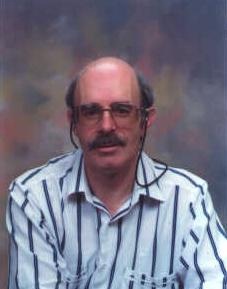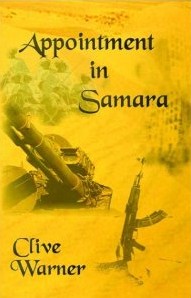Engineer Takes on Biological Weapons in CIA Thriller
By Jody Ewing
03/07/02
A part-time job with the CIA is fun, thinks engineer Martin Conley, until one day when a dying KGB agent gives him information that changes his life: a multi-warhead anthrax missile was installed in the ocean near Midway Island during the Cuban Missile Crisis.
Thus begins a physical and moral journey for this atypical hero in Clive Warner’s first novel “Appointment in Samara,” published March 1. Conley travels to the Wadi Hadhramount in South Yemen partnered with Alia, a beautiful Arab woman, to retrieve the weapon’s control codes. He’s soon drawn into a deadly civil war between North and South Yemen and finally must decide – will he obey his CIA masters – or make decisions based on ultimate good?

“Strangely, events have made it topical, although the first draft was completed 18 months ago,” says Warner, a former international project engineer who has lived and worked in more than 30 countries. “I was amazed when the anthrax attacks started. I remember thinking, ‘This can’t be true.'”
The story is intended to show that the simplistic, patriotic mind-set is not always necessarily right or just, and, if followed blindly, can lead to genocidal actions. Warner, who lives in North Mexico, says the idea for the book came from the History Channel.
“I was watching a program about the Cuban Missile Crisis on the History Channel where they were describing how the U.S. sent every ‘eye’ that it could to find the suspected missiles – satellites, surveillance aircraft, even regular jets at low level,” he says. “Suddenly the idea came: what if the crisis was just a diversion? Suppose, at the same time, while all surveillance was directed at Cuba, the Soviets were emplacing a super weapon, a ‘doomsday device,’ elsewhere?”
Since weaponized anthrax already had been developed, Warner settled on it for his doomsday device. He immersed himself in research, including data on the Gruinard Island tests that were used in early bio-war experiments by the British government. His goal was to write an authentic action-adventure that contained no holes in the plot. He also wanted to write a thriller that focused on engineers.
“Most people, in my experience, think engineers are boring people,” Warner says. “In reality engineers change peoples’ lives. Engineers build war machines and are indispensable on the battlefield.”
Additionally, Warner strove to break the stereotype that engineers are cold, unfeeling people. “They’re humans like any others, with the same capacity for emotion and loyalty,” he says.

The book ties in with Warner’s actual experiences and some of the book’s events are fictional versions of recent history. Having traveled to South Yemen twice, Warner installed a mobile phone system in the Wadi Hadhramount and surveyed 60 miles of coastal territory in the ‘Five Towns’ area. He was amongst a group of diplomats during President Ali Nasser’s visit to Sey’un in the Wadi.
“He made a speech which even I, with my poor Arabic, could see as a harbinger of war with the North,” Warner says. “Shortly after my visits, a civil war did indeed take place in the Yemen, between North and South.”
Warner based his title on Somerset Maugham’s short story from the ’30s, and going back further to the original Persian fable. In the fable, a man tries to flee from his fate, only to meet up with it in the very place he flees to. The title “Appointment in Samarra” also was used 20 years ago in the John O’Hara novel.
“My character, too, wants to avoid the dreadful responsibilities that descend upon him, but ultimately must accept the fact that some are chosen as the instruments of change,” Warner says. “There is a scene in the film ‘Zulu’ where, as thousands of Zulus are massing for the attack, a British soldier asks his sergeant, ‘Why us? Why do we have to be the ones?’ And the sergeant replies, ‘Why, because we’re ‘ere, lad. Because we’re ‘ere.'”
That line, says Warner, sums it all up. “Ultimately all of us must make some fateful decision ‘because we’re ‘ere.'”
Leave a Reply